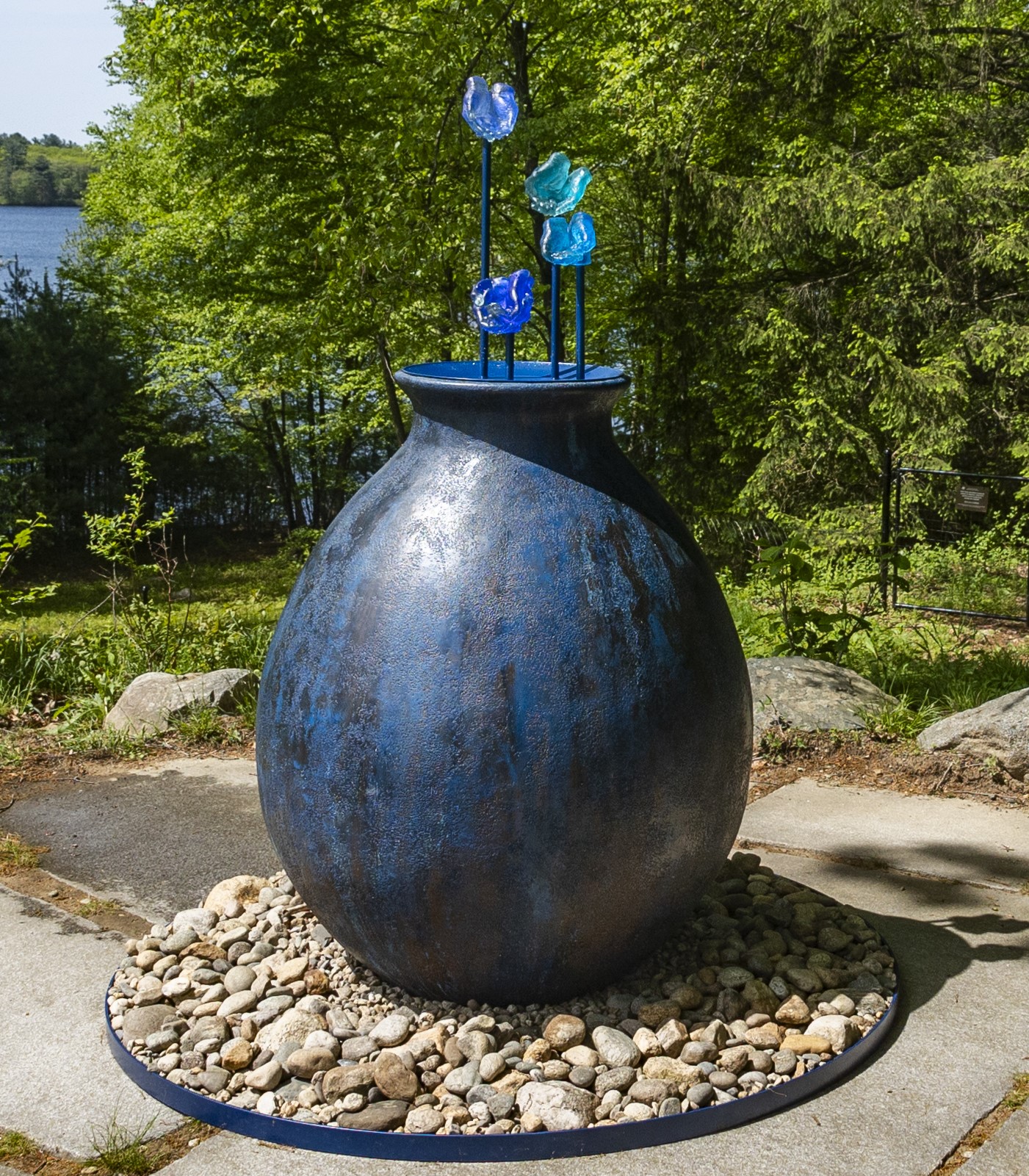Cupped hands, in gradient shades of blue glass, cascade in a formation that suggests flowing water into this oversized vessel. Evelyn Rydz cast the hands of local environmental caretakers and those who have a special connection to water, including Flint’s Pond, the body of water in view at deCordova. Flint’s Pond is a protected reservoir and provides drinking water to residents of Lincoln. Drawn to the diverse ways that people protect, pollute, and access water, Rydz named this sculpture Holding Water. The phrase alludes to a kind of “truth telling”—in this case about how water is sacred and necessary to all life, and yet clean water is not a given for so many. The glass hands are positioned in relationship to each other to suggest a passing of responsibility and knowledge across generations and among communities. The varying shades of blue of the glass and vessel are inspired by Rydz’s many photographs of the nearby water, which is constantly changing due to climate shifts, light, and time of year.
Perspectives of Enviromental Caretakers
The following quotes are from the people whose hands are featured in Holding Water. Click below to access full-length excerpts and other conversations with the artist, including an audio component and digital booklet.
| LISTEN HERE | READ THE BOOKLET |
Alicia Truthseeker Mitchell, Troy/Watuppa Indian (Pocasset Wampanoag), Perry Clan of Watuppa Reservation
Water is a living being. It holds emotions, it holds memory. Literally and metaphorically, spiritually. To think about how much of the world, how much we are water, physically as a planet and also as human beings, how much we are water and how much we rely on water— you can’t have one without the other. I think that water is life.
My people were and are of the land. And we only took what we needed. And we did it with honor. You never take something without offering or giving. So there’s a balance and there’s an understanding that there’s no separation. There’s no hierarchy when you’re in nature.
Michele Grzenda, Conservation Director, Town of Lincoln
As I continue my journey in this career, the thing I feel most rushed to do is to protect land. Because the rate of development is so extreme, and we have lost so much land in the last 50 years. Nature is the best filter. Our wetlands are the kidneys of nature. Without our wetlands and our protected buffers, I don’t see how we’re going to sustain clean water in a developed environment. Even though an environment, like a pond or conservation land looks pristine, it doesn’t mean there aren’t threats to it. And fundamentally it’s hard for us to grasp some of these major threats to our environment, to our waters.
Sonia Rydz, Mother of the Artist
El agua es como los hijos, los puedes tener por un tiempo pero al igual que el agua, se van entre tus dedos y forman otras ideas y otras generaciones. La esperanza es que estas nuevas generaciones vuelvan otra vez y sea como un círculo en el cual lo que yo aprendí de mis padres y lo que mis hijos aprendieron de mi pueda conservarse para el futuro.
Water is like our children, you can have them for a while, but like water, they slip through your fingers and form other ideas and other generations. The hope is that these new generations will return again, and it will be like a circle in which what I learned from my parents and what my children learned from me can be preserved for the future.
Tom and Nina Flint, 11th and 12th generation of Matlock Farm, Town of Lincoln
We’re part of something that is so much bigger than ourselves. And it also makes you question the relationship, our definition, of what is animate versus what is inanimate. You can think of water as being always in motion, having life, giving life. But we don’t think of water itself as an animate being. We think of ourselves and other animals as such, but where exactly do you draw that line? If we don’t have an overarching goal to preserve what matters, whether it’s land or certain agricultural practices, or bodies of water, then we can get lost. Because we’re not able to keep ourselves buttressed by anything. That’s a really important concept in our family, just to keep it going.
